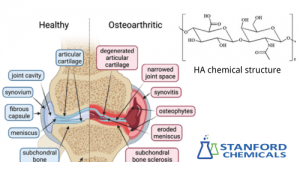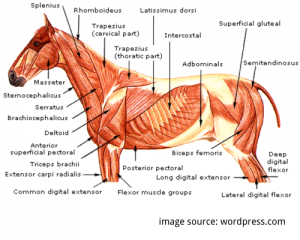What Are the Benefits of Hyaluronic Acid for Horse Health
Introduction
Hyaluronic Acid (HA) is a natural polysaccharide widely present in living organisms and plays a vital role in maintaining tissue health. In horses, HA not only has a significant impact on joint health, but also plays an important role in muscle and skin health. This article will elaborate on the many benefits of hyaluronic acid on horse health from the perspectives of horse joints, horse muscles and horse skin.
Hyaluronic Acid Benefits for Equine Joint Health
Anyone who owns horses knows that as horses age, joint problems often occur because of wear and tear. Hyaluronic acid is a key substance in treating joint diseases in horses. Because it has many benefits for the horse’s joints.
- Joint lubrication
For horses, especially those involved in high-intensity sports such as horse racing and jumping, joint lubrication is crucial. Because good lubrication can ensure smooth joint movement and reduce wear caused by friction, thereby extending the service life of the joints.
Over time, the life of horse joints can be extended. It is worth mentioning that synovial fluid plays this lubrication role in the joint cavity. This substance reduces friction between cartilage and bone. And hyaluronic acid is the main component of this synovial fluid.
- Buffering effect
Hyaluronic acid is highly viscoelastic, which allows it to act as a cushion in joints. During high-intensity exercise, equine joints bear tremendous impact. Hyaluronic acid reduces direct damage to joint structures by absorbing and dispersing these impact forces, thereby protecting joint cartilage and surrounding tissues.
- Anti-inflammatory effect
Hyaluronic acid has natural anti-inflammatory properties. Arthritis is a common joint disease in horses that causes pain, swelling, and limited movement. Hyaluronic acid reduces the inflammatory response and relieves arthritis symptoms by inhibiting the activity of inflammatory mediators and enzymes. Not only does this help improve your horse’s mobility, but it also improves their quality of life.
- Promote joint repair
Hyaluronic acid also plays an important role in promoting the proliferation and repair of chondrocytes. HA provides necessary nutrients and support to promote the regeneration of cartilage tissue, thereby repairing damaged joint structures. This is especially important for horses that have suffered joint injuries or suffer from chronic joint diseases.

Fig 1. Anatomy of the healthy and osteoarthritic knee joint[1]
Hyaluronic Acid Benefits for Horse Muscle Health
In addition to treating and preventing horse joint diseases, sodium hyaluronate is also very helpful in maintaining muscle healthy.
- Increase muscle elasticity
Hyaluronic acid is not only found in joints but also plays an important role in muscle tissue. HA helps maintain muscle elasticity and flexibility, allowing muscles to better adapt to stretch and contraction during exercise. This is especially important for horses involved in high-intensity training and competition to reduce the risk of muscle strains and other sports injuries.
- Relieve muscle pain
Horses often experience muscle soreness and fatigue after strenuous exercise. Hyaluronic acid helps relieve muscle pain and stiffness after exercise and speeds up the recovery process by promoting blood circulation and cell repair. This allows the horse to return to peak condition more quickly and be ready for the next training session or race.
- Improve muscle metabolism
Hyaluronic acid helps improve the metabolic function of muscle cells and improves muscle endurance and strength. By optimizing the cellular environment and improving cellular energy utilization efficiency, hyaluronic acid allows horses to maintain efficient performance for longer during high-intensity exercise.

Hyaluronic Acid Benefits for Horse Skin Health
Joints and muscles are two critical aspects of horse health. But the health of a horse’s skin is also deserved to pay attention. Healthy horse skin not only makes the horse more beautiful, but also effectively prevents many diseases. Hyaluronic acid has many properties that can be used to keep your horse’s skin healthy.
- Moisturize and repair
Hyaluronic acid is widely known for its excellent moisturizing abilities. It absorbs and locks in thousands of times its own weight in water, thereby maintaining skin’s moisture and elasticity. For horses, especially in dry and hot environments, hyaluronic acid prevents dryness and cracking of the skin, keeping the skin healthy and shiny.
- Promote wound healing
HA also plays an important role in promoting skin wound healing. It can accelerate the migration and proliferation of cells at the edge of the wound and promote the formation of new tissue, thus accelerating the wound healing process. This is particularly important for horses that have been injured during training or competition, reducing the risk of infection and healing time.
- Anti-inflammatory and antibacterial
HA also has certain anti-inflammatory and antibacterial properties. It reduces skin inflammation and relieves redness, swelling and itching caused by allergies or infections. At the same time, it can also inhibit the growth of certain pathogenic bacteria and protect the skin from infection. This makes hyaluronic acid an effective skin care ingredient for a variety of skin concerns.

Fig 3. Horses with skin disease and healthy skin[3]
Conclusion
Hyaluronic acid has a wide range of applications in maintaining horse health, offering improvements in joint health, muscles, and skin.
This compound is known for its ability to lubricate joints, making it a vital component in reducing inflammation and ensuring smooth joint movements. Additionally, it promotes muscle elasticity and metabolism, which is essential for horses’ overall performance and recovery. Hyaluronic acid also retains skin moisture and accelerates wound healing, keeping horses’ skin healthy and resilient. By providing comprehensive health support, hyaluronic acid helps in enhancing the quality of life and athletic performance of horses, making it a valuable addition to the care regimen for horse breeders and enthusiasts.
While hyaluronic acid offers numerous benefits, it is essential to be aware of potential side effects. Some horses may experience mild reactions such as swelling or discomfort at the injection site. In rare cases, allergic reactions may occur. It is crucial to consult with a veterinarian before starting any new treatment to ensure it is appropriate for your horse.
Understanding and rational use of hyaluronic acid can significantly improve horses’ well-being, making it a critical element in equine health management, whether in daily care or disease treatment.
Stanford Chemical Company (SCC) is at the forefront of HA powder development. We offer injectable grade, food grade, cosmetic grade and medical grade sodium hyaluronate powder. For more information about these HAs, please check out our homepage.
Related articles:
Hyaluronic Acid: Relieves Equine Arthritis
[1] Fig 1. Anatomy of the healthy and osteoarthritic knee joint. Created via canvas. Source: Smith, Abbi & Sigurbjörnsdóttir. (2022). Hedgehog signaling in bone and osteoarthritis: the role of Smoothened and cholesterol. The FEBS Journal. 290. 10.1111/febs.16440.
[2] Fig 2. Horse muscular system. Source: http://www.equisearch.com/horses_care/health/illnesses_injuries/backpain_causes_070803/
[3] Fig 3. Horses with skin disease and healthy skin. Source: https://agsolutions.com.au/skin-coat-conditions/
